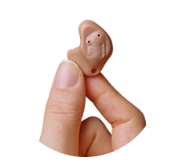Tinnitus Therapy
Once the ringing in my ears stopped, the headaches and dizziness did too.
Do you hear a ringing, roaring, clicking, or hissing sound in your ears? Do you hear this sound often or all the time? Does the sound bother you a lot? If you answered yes to any of these questions, you may have (ti-NIGHT-us or TIN-i-tus) and you should see a hearing professional.
Tinnitus therapy is designed to help you manange the noise in your ears.


